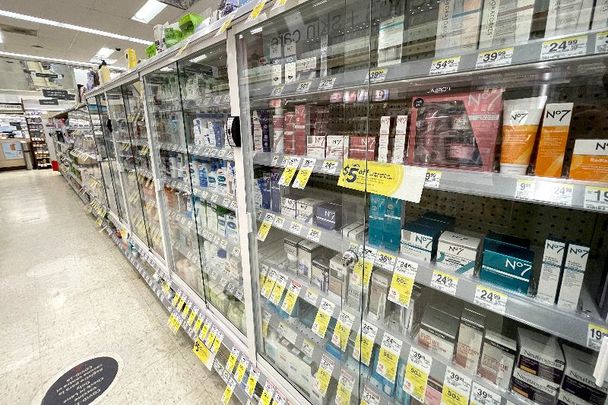If you have been to your local drug store lately, you will certainly have seen them; the long rows of see-through plastic cases that common retail products like toothpaste, vitamins, and deodorant are now increasingly locked behind.
Stores say that it's to protect themselves against highly organized waves of shoplifters, who will otherwise steal armfuls of these everyday products to sell online.
There is a thriving black market for cheap cigarettes, health and beauty products, over-the-counter medications, contraceptives, liquor, teeth-whitening strips, and other in-demand products, they say.
Because these companies can't ask their retail staff to put their lives at risk in a gun-saturated nation like America to stop thieves walking out of the store with a bag full of beauty products, these locked plastic cases are the best response to theft they insist.
But what about the consumer? How does it feel to shop in a place that looks like it's girding itself against the zombie apocalypse? All you wanted was some multivitamins, but now you feel like you're being treated like an international diamond thief?
You have to press an alert button to inform a member of staff about your shopping intentions – and then you have to wait for however long it actually takes for them to come along and release it for you (often they will never come at all).
What kind of carry-on is this? People understand why high ticket price items like gold and diamonds are kept under lock and key, but Right Guard deodorant? How much do you have to steal to make a worthwhile re-sale on the internet? Isn't there a better way to guard against the selling of stolen items than turning your local pharmacy into Fort Knox?
Most retail staff hate the locked shelves as much as the consumer, if the on-the-ground experience is anything to go by, and it is. Hearing a disembodied voice calling to you over the shop speaker system when a customer pushes a button must be as alienating for them as it is for the shoppers.
“Alert, help requested in aisle seven, bath and beauty products,” says the cooing voice and that's apparently the sales associates' cue to drop whatever they were doing and free some three-in-one toothpaste. What a use of their precious time. Who could have possibly had a problem with that?
But if you pull the camera back, and you should, you can see that something else is going on besides a pitched battle between retailers and thieves. You, the honest consumer, are being caught in their crossfire and having your own precious time wasted by a standoff you didn't contribute to.
Drug stores seem to be perpetually understaffed, with high employee turnover, which means that an already miserable shopping experience becomes a thing to actively dread. You just came for toothpaste, but now you have to stay to watch capitalism eat itself, with you as a trapped witness. It's depressing, it's even low-key enraging, and it's almost everywhere.
Will we soon start to discern the better classes of neighborhoods through the number of drug store locks? Will the freedom to pick up whitening strips without an exhausted store clerk helping you be a key indicator of a desirable location?
How are we living that the choice is either lose the merchandise or lose the customer? Reports say some drug store companies are looking to put literally everything behind locked cases soon, a common 19th-century practice that is making a far from welcome return.
And if you think this is just an inner-city problem, reports say that criminal gangs are spreading to the suburbs as the lock and key phenomenon drives them further afield. What looks like someone else's problem has a remarkable capacity to become your own problem here with notable rapidity.
It may seem like a small inconvenience to grouse about, but it speaks to a far more unsettling question about what kind of society we are and are quickly becoming.
So much of how we live is determined by the worst among us. The question we need to ask is how much of our freedoms are we prepared to sacrifice to them? Because from where I'm standing, it seems to have no end.




Comments